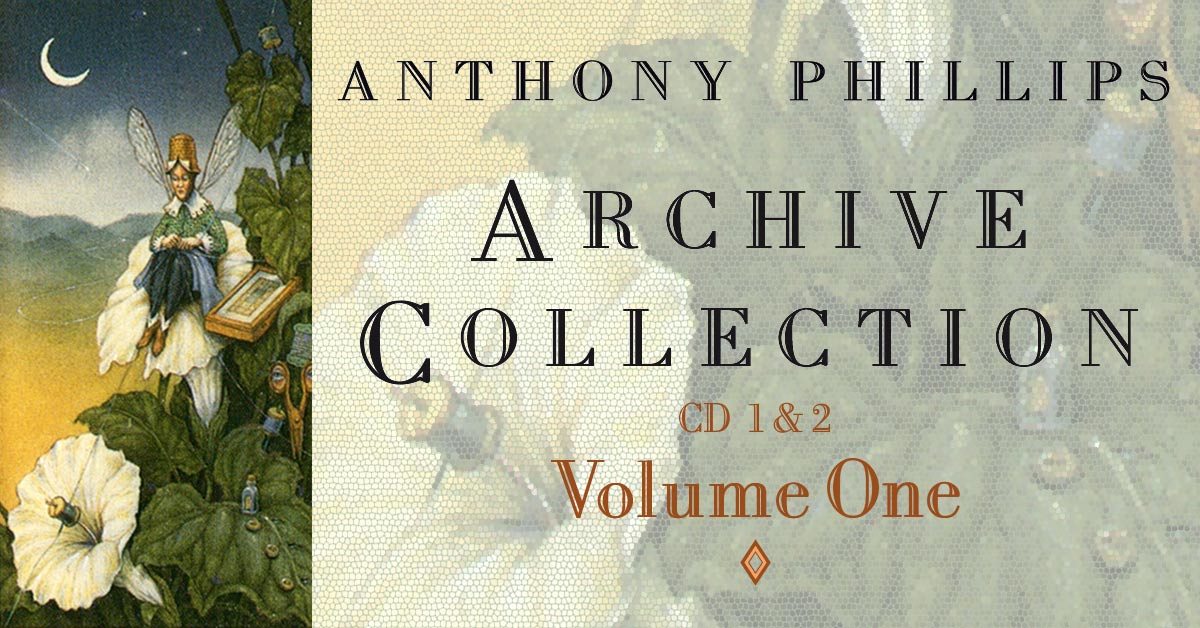- Article
- Read in 17 minutes
Anthony Phillips – Archive Collection Volume I (part of the 5CD-Boxset) – Track by Track
All tracks of the album Archive Collection Volume I, which is included in the 5CD set and extended by some tracks, are discussed individually in this article.
Overview | review | Tracks Volume I | Tracks Volume II | Masquerade-Special
The album The Archive Collection Volume One has been expanded by several tracks for the new 5CD box set. In this article you can read details about the individual tracks.
Notes:- In the duration given for the tracks, there is now and then a comparison between the current release (X:XX) and the Blueprint release [X:XX] from 1998.
– If it is a new mix compared to the first edition, the title of the track is blue.
CD1
1. Back To Pluto (1987) (0:30)
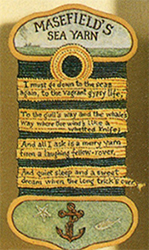
When the piece was written, Pluto was still a planet. It was discovered on 18 February 1930 and demoted to a dwarf planet in 2006 at the General Assembly of the International Astronomical Union IAU in Prague. That doesn't change the fact that Phillips' Back To Pluto consists of a short keyboard crescendo-decrescendo that peaks exactly in the middle at 0:15. Back To Pluto was recorded during the making of Private Parts & Pieces VII: Slow Waves, Soft Stars. If you listen closely, you can identify Ralph Bernascone's virtuoso contribution on a meteorite.
Apparently, the dwarf planet Pluto also has a very special effect on Ant. On Private Parts And Pieces VII: Slow Waves, Soft Stars there is a track entitled Pluto Garden.
2. Promenade (Alternate Version 1986) (3:41) [3:44]
Promenade was first released on the very rare vinyl sampler Double Exposure, compiled in 1987 by Steven Wilson (Porcupine Tree) for promotional purposes for No Man's Land Records. Presumably only 700 copies of this compilation exist. Promenade was recorded in 1986 during the same sessions as Chinese Walls for the album Private Parts & Pieces IX: Dragonfly Dreams. On the CD Pathways & Promenades – Missing Links Volume IV, the 18-second longer version was released in 2009, which was already heard on Double Exposure – but remixed. Ant presents us here with a slimmed-down version in which, in contrast to the other version, only the 12-string guitar can be heard.
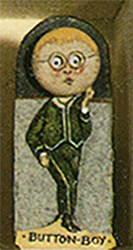
3. Take This Heart (Demo 1972) (4:13) [4:19]
modified Fade-Out!
The Charterhouse Choral Society's hymn [working title: Hymn] Take This Heart was penned by Anthony Phillips (music) and Mike Rutherford (lyrics) and first released on the Charisma Records compilation Beyond An Empty Dreamin April 1975. Ant's piano demo, unfortunately faded out at the end, is 67 seconds shorter than the choral version recorded at Charterhouse Chapel in Godalming in October 1973. The 2019 reissue of the Seventh Heaven album includes ten additional recordings on the bonus CD, including the choir version of Take This Heart as the tenth track. Incidentally, in the summer of 1973, in the course of various demo recordings with Phil Collins, Take This Heart was also recorded with Collins vocals!
4. Beside the Water's Edge (Demo 1977)(3:44)
The demo version of Beside The Water's Edge sung by Phillips dates from the summer of 1977, when Ant was putting together potential song candidates for his album Wise After The Event. The song itself was written by Phillips and Rutherford in 1969. So what we have here is a track that could have made it a Genesis song on Trespass. Close your eyes, introduce the band to it. It works.
Should Tom Morgenstern's grandiose THE ANT BAND record a second album (Another Light On The Hill maybe?) after A Light On The Hill, Beside The Water's Edge would definitely be a candidate for Phillips pieces with a certain proximity to Genesis. To go with this, a few more suggestions: Old Wives Tale (aka Little Leaf) / Queen Bettine / Deep In The Night / What Is The Meaning / Farewell / Collections / The Beggar And The Thief / Field Of Eternity / Creation. The ANT BAND's previously released Stranger and Lucy: An Illusionshould also be mentioned for the sake of completeness.
5. The Geese and The Ghost (Kiddies Mix 1975)(2:01)
This two-minute excerpt from The Geese & The Ghost was intended by Phillips and Rutherford as a possible subject for a children's TV programme – which never happened. The Geese & The Ghost passage edited for the "Kiddies Mix" can be found in the original from minute 5:48 to 7:40.
6. Which Way the Wind Blows (Alternate Version 1974) (2:35)
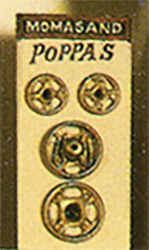
There are quite a few who count Which Way The Wind Blowsamong the absolute Anthony Phillips highlights. On this short test recording you can hear how it would have sounded if Ant had taken over the vocals on this song instead of Phil Collins.
Andreas Lauer wrote in the autumn of 1998 in it-magazine No. 25: "In comparison, it is noticeable that Phil plays more with his voice, savours longer notes more, sings voiced 'S' sounds also voiced and overall interprets the text more aptly through articulation and phrasing; the instrumental postlude is missing, and Mike participates here on guitar and glockenspiel."
Track 10 of Archive Collection Volume One, Disc Two features a version of God If I Saw Her Now, also featuring Ant singing the later Collins parts.
7. Rowey Song (1972) (4:14) [4:11]
In 1997, Ant took the time to look through some old recordings. He came across the Rowey Song, which he had recorded in the winter of 1972 on a six-string guitar. See also track 20 (Rowey Reprise).
8. Lucy Will (Demo 1978) (3:59) [3:05]
Lucy Will is familiar to us from Ant's fourth (counting Private, Parts & Pieces) solo album Sides from 1979. The demo dates back to 1978, and to this day it remains an open question: Who is Lucy, who appears once again as Illusion on the CD re-release of Private Parts & Pieces II: Back To The Pavilion and as track no. 7 on Archive Collection Volume One, Disc Two?
9. God If I Saw Her Now (Demo 1970) (3:34)
Due to very detailed records, we know that this demo recording was made on 28 and 29 July 1970. Ant played a Stratocaster and a Höfner Colorama electric guitar alongside a nylon-stringed guitar. The recording was discovered in 1995 and is one of Phillips' earliest solo demo recordings. In 1977, the song was remastered by Phil Collins and Viv McAuliffe on The Geese & The Ghost.
10. In Memoriam Ad (Demo 1970)(3:26) [3:23]
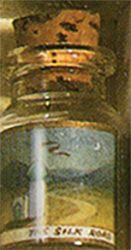
This is – yes, that's right, Reaper, which was still called In Memoriam Adwith a working title. Like God If I Saw Her Now, it comes from Ants' earliest demo recording sessions, to which Harry Williamson contributed a few effects. Reaper appeared in a much longer version (6:12) on Phillips' first Private Parts & Piecesalbum in 1978, and as Electric Reaper was part of the five-part Scottish Suite released on Private Parts & Pieces II: Back To The Pavilion in 1980. Phillips wrote the rest of the music for Scottish Suite in 1976 for a project that would combine Shakespeare's Macbeth dialogue with rock music. However, the planned six-album set was never completed in the end, on the grounds that it was too daring and ambitious.
11. Hunt Song (Demo 1977) (6:49) [6:54]
That is – yes, exactly, Now What (Are They Doing To My Little Friends?), which was still called Hunt Song with a working title. Phillip's sad protest against the brutal slaughter of animals clearly gained in the final version of the album.
12. Rule Britannia Closing Theme (1981)(1:08) [1:10]
In 1981, James Bellini's six-part cultural documentary Rule Britannia was shown on ATV. Anthony Phillips contributed, among other things, the short keyboard piece Rule Britannia Closing Theme, which ran during the end credits. The Rule Brittania Suite is featured on the bonus CD of the 1984 album re-release with six tracks.
13. Exocet (Instrumental Mix 1982) (3:21) [3:10]
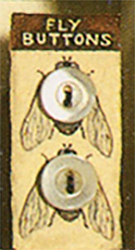
Exocetappeared as a song in 1983 on the album Invisible Men, which Anthony Phillips recorded in 1982 with Richard Scott and several other musicians. Jeff Dunne is heard here on drums. The piece also works without vocals with more than a hint of Peter Gabriel atmosphere. Very worth listening to and almost too short. Even without the lyrics, which deal critically with the madness of the Falklands War, Exocet spreads a threatening atmosphere. Exocet is a so-called sea target missile. Sounds rather harmless, but it is nothing more than a euphemism for a barbaric instrument of mass murder. After the album was finished, the management of the British label Street Tunes Records, which released the album, considered Exocet too political and ordered its removal. Could hurt sales, after all. Shabby. Cowards. The song The Women Were Watching (see track 23) on Invisible Menalso deals with the Falklands War.
14. Study In G (1978) (3:49) [3:51]
In 1980, the Josef Weinberger publishing house published the 20-page booklet Six Studies For Guitarwith seven (!) pieces by Anthony Phillips. Among them, as the fourth piece (so they can count after all), Study No. 4 in G major, which we get to hear here. Phillips recorded it in 1978, it was rediscovered in 1997. Phillips' recordings exist of all pieces (with the exception of Study No. 1 in E major), some of which have already been published:
Study No. 1 in E major- (A Light On The Hill, THE ANT BAND, Gereon Schoplick, 2021)
Study No. 2 in D major- Private Parts And Pieces, Extra Pieces (Re-Release 2018)
Study No. 3 in E major
Study No. 4 in G major
Rhapsodyfrom The Field Of Eternity
Nocturne – Private Parts And Pieces II: Back To The Pavilion
– Field Day (Neuaufnahme)
– Seventh Heaven (Orchesterversion)
– Sueños (Quique Berro García, 2003)
Lullaby (Two Versions)
15. Holy Deadlock (Vocal Mix 1978) (1:51) [0:53]
For the new release of the Archive Collection Volume One, the vocal mix of Holy Deadlock was fortunately extended by almost a minute, which clearly enhances this track. The "Bom-bom-bom" in the outro is very nice. You can hear Anthony Phillips, Dale Newman, and Dan Owen. Ray Cooper (or according to the old booklet Michael Giles?) plays a wolf. A nice gimmick.
16. Catch You When You Fall (1978) (3:14)
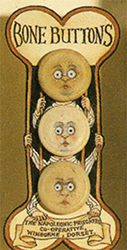
The poppy Catch You When You Fallwas recorded for Sides, but did not make it onto the album because Phillips was unhappy with the lyrics. The rough mix here is not identical to the instrumental mix on the 2010 re-release of Sides. The version on the bonus CD was remixed from the 24-track master. However, also without vocals. At least here you can listen to John G. Perry's fine bass playing unhindered. It is not known whether there is a recording with vocals at all.
17. F Sharp (Demo 1969) (2:41) [2:48]
shortened and worse fade-out!
In September 1969, Genesis rehearsed for a fortnight at Send Barns. During these sessions, Ant and Mike decided to record some of the many instrumentals and songs they had written together. The missing tape was recovered in August 1995.
F Sharp is the written term for our F# and refers to a special guitar tuning where the high E string and the G string are tuned to F#. This results in the tuning E – A – D – F# – C# – F#. F Sharp was subsequently used to create the Genesis classic The Musical Box from the Nursery Cryme album. Most of F Sharp and the end of F Sharp 2 [see track 19] were put together to form Manipulation, recorded on 9 January 1970 as part of the legendary Genesis Plays Jackson tapes.
18. The Geese And The Ghost (Demo 1969) (6:35) [6:38]
This demo version was created in the course of recording F Sharp and F Sharp 2 and offers the opportunity to hear for the first time several parts that did not appear in the version of this piece released on the later album.
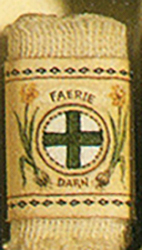
Andreas Lauer wrote in 1998 in it magazine no. 25: "The demo ofThe Geese And The Ghost, still calledD Instrumental at the time, also played with the two guitars, is amazingly close to the guitar parts of the album version recorded in 1974; a later drum fill is improvised by tapping on the guitar body".
19. F Sharp 2 (Demo 1969)( 4:42) [4:44]
Andreas Lauer wrote in 1998 in it magazine no. 25: "F Sharp 2 is a hitherto unknown track with rhythm & blues elements; under technically very difficult conditions – you could only hear the first track from a tiny loudspeaker – overdubs were made here with Ant on drums, Mike on bass and Richard Macphail with the tambourine".
20. Rowey Reprise (1972) (1:19)
A pretty sketch for a gentle guitar solo. An epilogue to track 7 (Rowey Song).
21. Slow Dance (Single Demo 1990) (2:41)
After recording the album Slow Dance, Ant worked on a single, for which he picked one of the many Slow Dance themes. The plan was that a single (working title: Soft Single) could be helpful for promotion. Virgin Records disagreed and so this demo disappeared until it was dug up again for The Archive Collection Volume One.
22. The But-Out Cattle Truck Hits the Road (1991) (0:18)
Hurry, hurry, out on the road with the cattle truck! There are only 18 seconds left! The But-Out Cattle Truck Hits the Road was discovered on the same tape as the single demo of Slow Dance.
23. The Women Were Watching (Instrumental Mix 1982) (5:19)
Another instrumental mix of a song from the widely underrated Invisible Men album. The Women Were Watchingalso exists in the vocalless version and is 31 seconds longer than its sung counterpart.
CD2
Tracks 6-18 are previously unreleased!
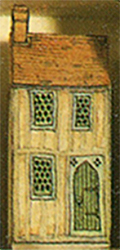
1. KIP PJ (1978) (0:30) [0:32]
"What's that now?" asks the ready-for-anything Anthony Phillips fan. "A variation on a previously unheard song!" replies Ant. I see. Does that get us anywhere? No. Does the mysterious title get us anywhere? No! And then the work was parked backwards, too. We rack our brains and Ant grins. Bet that?
2. Queen Bettine (Demo 1972) (4:16)
Queen Bettine belongs to the category of "Phillips songs with Genesis references" (see Archive Collection Volume One, Track 4: Beside the Water's Edge). Ant recorded this song, which he had written with Mike Rutherford in December 1968, as a demo already in September 1969. But due to the miserable sound quality (which we wouldn't care about at all) this sound document from Genesis' early days is regrettably not presented to us here. Another demo from 1 August 1970 is lost. Mike didn't play on the 72 demo, but at least its 12-string Zematis can be heard. For the Mechanics, Rutherford doesn't need this instrument any more anyway. Unfortunately…
This version of Queen Bettine from the summer of 1972 was recorded at the same time as the demos of Winter's Thaw, The Old House, Hymn (aka Take This Heart) and Field Of Eternity. You can read the details in the Anthony Phillips Recording Compendium.
3. What Is the Meaning? (Demo 1969)(2:43)
4. Farewell (Demo 1969) (3:15)
Two more Phillips/Rutherford co-productions. The sound quality is not very good, but this does not bother the Genesis fan who wants to know EVERYTHING about his band and hear EVERYTHING from his band. On the first edition of the Archive Collection Volume One these two pieces ran coupled as track 3, which has kindly been corrected here.
5. Cradle Song (1978) (9:04) [8:53]
modified Fade-Out!
Ant wrote this lullaby in 1972, but the present recording dates from 1979. Ant enchants us with his virtuoso piano playing. If you like the album Soirée (Private Parts & Pieces X) from 1990, you will also like the Cradle Song. On the first release on The Archive Collection Volume One, the piece was unnecessarily left out. This time we are not deprived of the missing 11 seconds. Good thing.
6. Master of Time (Instrumental Version 1973)(7:26)
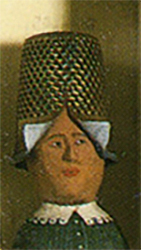
Already on the re-release of The Geese & The Ghost in 2008, we were presented with a demo recording of Master Of Time. This instrumental version of the song (which unfortunately could not be completed for The Geese & The Ghost due to lack of time) does not feature the harmonium playing of Ronnie Gunn, who, however, helped Phillips with the recording together with David Thomas. Ant used two Revox two-track recorders to record the demo. He didn't have the better-equipped TEAC multitrack machine at the time. With the meagre possibilities, the "naked" version was created – as one could say in analogy to the version of the Beatles' album Let It Be, which was released in 2003. At the same time as Master Of Time, The Beggar And The Thief was also recorded in demo form (see and listen to Missing Links Volume 2: The Sky Road).
7. Lucy: An Illusion (1978) (4:32)
You can't get more unplugged than that. Lucy: An Illusion was already recorded with Rutherford in 1969, but here we get to hear the somewhat slower version from March 1978. Ant sings his song without any overdubs to the guitar. An interesting addition to the elaborate recording that was added as a bonus track on the 2007 re-release of Private Parts & Pieces II: Back To The Pavilion. The song I Saw You Today (track 11 on Archive Collection Volume II, Disc Two) was recorded at the same time as Lucy: An Illusion. For more, see there.
8. Henry Goes To War (Guitars Only Mix 1975) (4:07)
Naked again: Henry: Portraits From Tudor Times, Part Five: Henry Goes To War from the album The Geese & The Ghost. The piece is well known to all of us. In this recording from July 1975, only the guitar tracks are heard: Mike Rutherford plays the acoustic guitar, Anthony Phillips the electric.
9. Sleepfall Celeste (1976)(1:01)
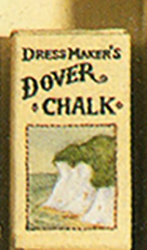
On 6 November 1976 Ant found himself at Olympic Studios to do some overdubs for Collections and Sleepfall: The Geese Fly West. Phillips used the celesta* that was "standing around" for the outro of Sleepfall. In the final album mix, the celesta is almost completely lost. This stepmotherly existence comes to an end with Sleepfall Celeste.
* A celesta is a piano-like instrument in which steel plates with felt-covered hammers are struck via a keyboard and piano mechanism.
10. God If I Saw Her Now (Alternate Version 1975) (4:13)
Track 6 of Archive Collection Volume One, Disc One features a version of Which Way The Wind Blows with Ant singing the later Collins parts. Similarly, we hear a recording of God If I Saw Her Now with Ant vocals from July 1975. John Hackett's flute solo is missing from this mix.
11. Make The Best Of A Bad Situation (1982) (3:43)
And now to something completely new: While working on the first phase of recording Invisible Men, Phillips wrote a few songs with Nick Battle, including Make The Best Of A Bad Situation. Ant recorded a piano demo of this song in May 1982. Whenever I listen to Ant's piano recordings, I germinate the wish that Phillips would have played/would play his beautiful pieces on a grand piano. A hint with the fence post, dear Ant! In English: A broad hint!
12. Regrets (Initial Orchestral Run-Through 1977)(5:54)
For the recording of the orchestral parts of Regrets from the album Wise After The Event, an orchestral session with conductor Gilbert Biberian took place at CBS Studios in London. Before the official recordings, the orchestra played a test run of the piece, which was recorded. Parts of it have now been mixed for the first time. Compared to the finished song, Regretsis played here at a slightly slower tempo. WON-DER-FUL!
13. Nightmare Link (1978) (0:52)
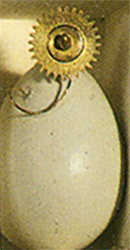
In November 1978, Ant recorded some overdubs for the song Nightmare, which was released on the album Sides. For this he experimented with a guitar synthesizer. This 52-second snippet gives us the opportunity to get a small, isolated insight into a part that is otherwise lost in the overall arrangement.
14. Greenhouse (Instrumental Mix 1977) (3:00)
The first recording sessions for Wise After The Event took place in October 1977 at Essex Studios in London. Bass, drums and the first guitar and piano parts were recorded there. During the recording of Greenhouse, Jeremy Gilbert, the song's co-writer, played some keyboard parts to which Ant added guitars and vocals. For this new mix of the song, the vocals were left out. A perfect template for the next karaoke night. However, Greenhouseis not easy to sing.
15. In Absentia (Demo 1971) (2:39)
Ant first met Harry Williamson in the winter of 1968, but it was not until the summer of 1971 that they had the opportunity to spend enough time together to write pieces (e.g. Gypsy Suite) and experiment with echo effects, for example. This happened in the London district of Maida Vale in the attic room of their friend Mike Pallis. They set up a small recording studio with a Bang & Olufsen tape recorder and recorded some demos. In Absentia came about as an improvisation. At the time, Ant had in mind to develop a concerto for the twelve-string guitar. The approximately eleven-minute piece Flamingo on the first Private Parts & Pieces album emerged from this intention, as did Field Of Eternity.
16. Stranger (Demo 1970)(6:12)
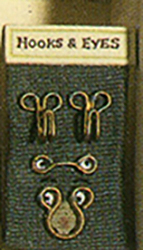
1969. Strangerwas a song Ant's Genesis colleagues liked. They tongue-in-cheek called the song "Strangler" because Ant struggled to sing the notes in the middle section. Strangerwas played by Genesis at their first live gigs, but dropped from the set as "too introspective" for the audience of the time. The song disappeared into the drawer until 1990, when it was brought back to light for the CD reissue of the first Private Parts And Pieces album.
Before Ant's recording in 1990, Strangerhad already recorded several demos. One was also by Genesis! Unfortunately, this recording has not resurfaced to this day. A recording by Rutherford and Phillips from 1969 is also still waiting to be rediscovered. So it is all the more pleasing that the present version from 1970 could be unearthed during excavations. Stranger was one of the songs Ant recorded with the help of Harry Williamson and Dave Rootes in the summer of 1970 – shortly after leaving Genesis.
The recordings with the, from today's point of view, prehistoric Beochord recording device were not easy in terms of volume balance. But for a bootleg-trained ear, this should not be a problem even in the year 2022. The main thing is that we get to hear the "stuff".
17. Master Of Creation (Demo 1969) (3:36)
Although much of Master Of Time was written after Ant had left Genesis, this September 1969 piece shows that part of the melody line for the song had already been composed, as can be heard in the first part of this piano recording. The second part of Master Of Creation features an early version of Creation, which Ant had already written in 1968 but which was not recorded in its entirety. 31 years later, Phillips rediscovered the piece for his piano album Soirée (Private Parts And Pieces X).
18. Pennsylvania Flickhouse (Anon Demo 1966) (2:57)
The band Anon was formed in Charterhouse in May 1965. They included Anthony Phillips and Rivers Job (who had previously been members of the band The Spiders), Richard Macphail, Rob Tyrrell and Mike Rutherford. Anon initially played cover versions of well-known songs, but soon began writing their own material. One of the band's earliest original songs was Pennsylvania Flickhouse. The working title Satisfaction-type one gives a clear indication of the inspiration behind it. The recording for Pennsylvania Flickhouse at Tony Pike's studio were successful and a number of acetate records were made, two of which are still owned by Richard Macphail and Mike Rutherford.
In 1997 Richard's acetate of Pennsylvania Flickhouse, which he had guarded like the apple of his eye for 30 years, was digitised to preserve the recording. In 2011, the band members (except for Rivers, who died in a train accident in 1979 – R.I.P. Rivers Job!) gave permission to the German Genesis fan club it to release the track for the first time as a limited edition CD single for the club's 20th anniversary.
Archive Collection Volume I & II is available via CherryRed.
Author: Bernd Vormwald
Edited by Helmut Janisch and Christian Gerhardts
Visuals: Helmut Janisch (based on the orignal artworks)

